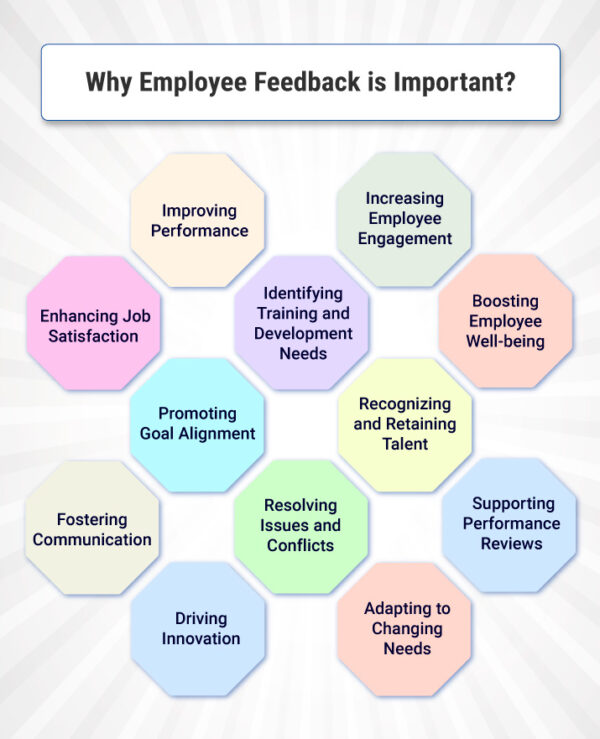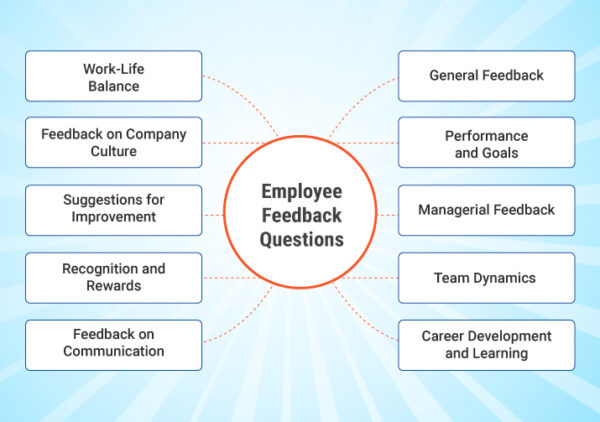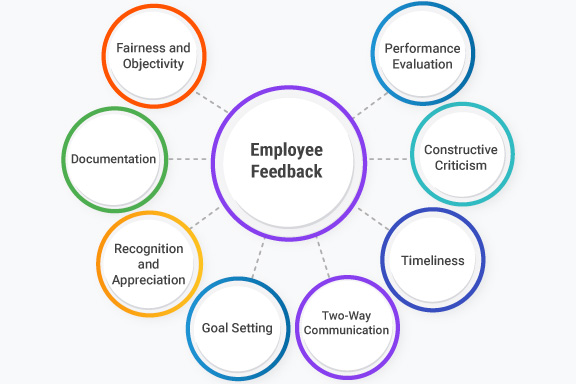Table of Contents
What is Employee Feedback?
Employee feedback is defined as a communication process in which employers or supervisors provide constructive comments and assessments to their employees about their performance, behavior, or other aspects of their work. The primary goal of employee feedback is to help employees understand how they are performing, what they are doing well, and where they can improve. It is an essential tool in performance management and employee development.
Key aspects of employee feedback include:
- Performance Evaluation: Feedback often involves evaluating an employee’s performance based on specific criteria, such as job responsibilities, goals, or key performance indicators (KPIs).
- Constructive Criticism: Feedback should not only focus on what employees are doing right but also provide constructive criticism about areas where they can improve. This helps employees understand their strengths and weaknesses.
- Timeliness: Feedback should be provided regularly and not limited to annual performance reviews. Real-time or ongoing feedback is valuable in helping employees make immediate adjustments.
- Two-Way Communication: Effective feedback should encourage a dialogue between the employer/supervisor and the employee. Employees should feel comfortable asking questions, seeking clarification, or providing their perspectives.
- Goal Setting: Feedback can be tied to setting future goals and objectives for the employee. This ensures that the feedback process is forward-looking and helps employees understand how they can grow and develop in their roles.
- Recognition and Appreciation: Positive feedback is also important for recognizing and appreciating employees’ efforts and achievements. It reinforces good behavior and motivates employees.
- Documentation: It’s often helpful to document feedback discussions, especially for performance reviews and disciplinary matters. This documentation can serve as a record of the employee’s progress and any commitments made during the feedback process.
- Fairness and Objectivity: Feedback should be fair, objective, and based on observable facts rather than personal biases or emotions.
Effective employee feedback can lead to improved job performance, increased job satisfaction, and enhanced employee engagement. It also contributes to a more transparent and productive work environment where employees feel valued and have a clear understanding of their roles and responsibilities.
Why Employee Feedback is Important?

Employee feedback is important for several reasons, and it plays a significant role in the overall success and health of an organization. Here are some key reasons why employee feedback is crucial:
- Improving Performance: Employee feedback helps individuals understand how they are performing in their roles. It provides insights into their strengths and areas that need improvement, allowing them to make necessary adjustments and excel in their jobs.
- Enhancing Job Satisfaction: When employees receive regular feedback, they feel valued and recognized for their contributions. This, in turn, leads to higher job satisfaction, increased morale, and a more positive work environment.
- Increasing Employee Engagement: Engaged employees are more committed to their work and the organization’s mission. Feedback fosters engagement by involving employees in discussions about their roles, goals, and career development.
- Identifying Training and Development Needs: Feedback helps organizations identify specific skills or knowledge gaps among their employees. This information can be used to tailor training and development programs to address these needs, ensuring a more skilled and capable workforce.
- Promoting Goal Alignment: Employee feedback aligns individual goals with organizational objectives. When employees understand how their work contributes to the company’s success, they become more motivated to achieve those goals.
- Fostering Communication: Feedback encourages open and honest communication between employees and management. It creates a culture of transparency, where concerns and ideas can be shared freely.
- Recognizing and Retaining Talent: Recognizing and appreciating employees’ efforts through feedback can help retain top talent. Employees who feel valued and appreciated are less likely to seek opportunities elsewhere.
- Resolving Issues and Conflicts: Feedback can be a constructive way to address workplace issues and conflicts. By providing a platform for discussing concerns, organizations can work toward resolution and maintain a harmonious work environment.
- Driving Innovation: Employee feedback can be a source of innovative ideas and insights. Employees on the front lines often have unique perspectives that can lead to process improvements and innovation within the organization.
- Supporting Performance Reviews: Constructive feedback is essential for effective performance reviews and evaluations. It provides a basis for setting goals, assessing progress, and making informed decisions about promotions, raises, or career paths.
- Boosting Employee Well-being: Knowing that their input is valued and acted upon can contribute to employees’ overall well-being. It reduces stress and anxiety, as employees feel their voices are heard and respected.
- Adapting to Changing Needs: Organizations are not static, and they need to adapt to changing market conditions and customer demands. Employee feedback can provide valuable insights into how the organization can evolve and stay competitive.
Employee feedback is a powerful tool that drives employee development, engagement, and organizational growth. It fosters a culture of continuous improvement and communication, ultimately benefiting both employees and the organization as a whole.
Learn more: What is Employee Engagement?
Top 8 Employee Feedback Examples
Offering constructive feedback is pivotal for cultivating a supportive workplace atmosphere and promoting the professional advancement of employees. Here are actionable examples of employee feedback that can help managers and leaders support their team members:
1. Positive Reinforcement
- Your dedication and attention to detail on the recent project were outstanding. Your contributions significantly contributed to the team’s success.
- Your consistent ability to meet deadlines and deliver high-quality work is invaluable to our team’s success.
2. Constructive Criticism
- Your communication with team members could be improved by providing regular updates and being more proactive in sharing information.
- Let’s work together to improve your time management skills and prioritize tasks more effectively.
3. Specific Task Feedback
- Your presentation during the client meeting was impressive, but consider brushing up on technical areas for better preparedness.
- While your report contained valuable insights, condensing the information could make it more concise and easier to digest.
4. Behavioral Guidance
- Please be mindful of allowing everyone a chance to speak during team meetings, as interruptions can hinder collaboration.
- Leverage your composure in high-pressure situations to maintain focus and meet tight deadlines effectively.
5. Goal-Oriented Direction
- Let’s establish a goal for you to mentor a junior team member over the next quarter to further nurture your leadership capabilities.
- Your goal for the next month is to increase productivity by 10%, and I’m here to support you in achieving that.
6. Soft Skills Development
- Continue practicing active listening skills, as they enhance your ability to address client concerns effectively.
- Your empathy in dealing with team members fosters a positive team atmosphere and strengthens collaboration.
7. Recognition and Appreciation
- Your unwavering commitment during the hectic season did not go unnoticed, and I appreciate your dedication.
- Your creative ideas add a unique perspective to our projects, and I want to recognize your valuable contributions.
8. Professional Development Opportunities
- Consider enrolling in a project management course to enhance your skills and open up new opportunities for growth.
- Let’s work on improving your public speaking abilities, as they are essential for your evolving role.
Remember to tailor your feedback to individual team members’ needs and circumstances, fostering a culture of continuous improvement and growth within your organization.
Learn more: What is Customer Engagement?
Employee Feedback Questions

Asking the right questions is crucial for obtaining meaningful and constructive employee feedback. Here are some key questions you can use to gather feedback from your employees:
1. General Feedback
- On a scale of 1 to 10, how would you rate your overall experience collaborating with us?
- What aspects of your role do you find most rewarding?
- Are there any challenges you face in your day-to-day tasks?
2. Performance and Alignment
- Do you feel your tasks and responsibilities align with our company’s mission?
- How clear are your goals and objectives within your role?
- What improvements would you suggest to enhance alignment and performance?
3. Managerial Support
- Rate the quality and frequency of communication with your supervisor.
- Do you receive adequate support and feedback from your manager?
- How can your manager better assist you in achieving your goals?
4. Team Collaboration
- Describe the level of teamwork within your team or department.
- Are there any teamwork-related issues that need attention?
- What strategies can we implement to improve collaboration and communication among team members?
5. Career Development
- Do you feel supported in your career growth within the organization?
- Are there specific skills or areas you’d like to develop further?
- What opportunities for advancement do you seek within our company?
6. Work-Life Balance
- How would you rate your work-life balance?
- Are there any obstacles hindering your work-life balance?
- What measures can we implement to improve work-life balance for our employees?
7. Company Culture
- Describe our company culture and its alignment with your values.
- Suggest any improvements you believe could enhance our company culture.
- What aspects of our culture do you appreciate the most?
8. Process Optimization
- Share any suggestions for streamlining processes within your department or organization.
- Identify tools or resources that could improve efficiency in your role.
- How can we better support your success and well-being through process improvements?
9. Recognition and Motivation
- Do you feel adequately recognized for your contributions?
- Recommend any recognition or rewards programs that would motivate you and your colleagues.
- Is there any specific recognition you’d like to receive that hasn’t been acknowledged?
10. Communication Effectiveness
- Rate the effectiveness of communication within our organization.
- Identify any communication channels or methods you find particularly helpful or lacking.
- Share your suggestions for enhancing internal communication practices.
Learn more: What is Market Research Analysis?
Most Recent Blogs
Explore the latest innovation insights and trends with our recent blog posts.










